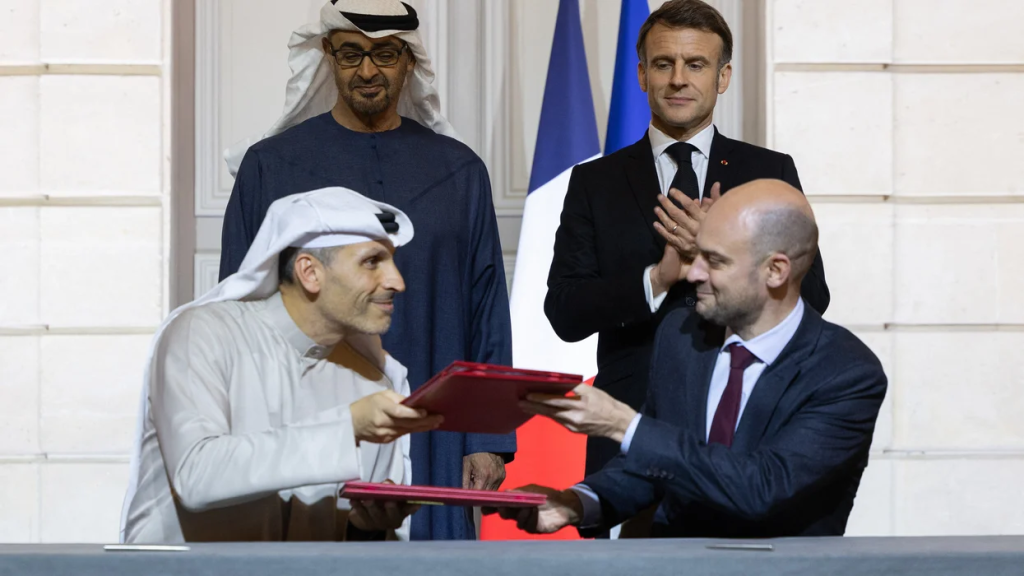Abu Dhabi is quickly becoming a major player in the field of artificial intelligence (AI). This is because it recently launched MGX, a specialized fund that has recently joined Donald Trump’s Stargate project to improve American AI capabilities. Many people are calling this project the start of a new golden age for the Gulf area.

As WorldCrunch reported, a scientist from France and Algeria named Hakim Hacid is in the lead of these changes. He is in charge of study at the Abu Dhabi Technology Innovation Institute (TII). The institute, which he runs, made Falcon, the first large-scale language model (LLM) that was completely made in the UAE. OpenAI’s ChatGPT and Google’s Gemini are two well-known AI systems from Silicon Valley that this model is meant to compete with. Hacid’s team is also making Falcon versions in Hindi, Farsi, Swahili, and Urdu, among other languages.
International experts are paying attention to what the UAE is doing in AI. A well-known AI expert from Oxford University named Philip Torr said that the UAE’s efforts are very important and that other countries should pay attention so they don’t fall behind. Nicolas Granatino, a French venture capitalist, agreed with this and said that the Emirates are different from bigger tech countries like China and the U.S. because they are willing to take risks and have political will.
Now, the UAE is one of the top places in the world for developing AI. After Trump announced the Stargate project, which aims to raise $500 billion for American AI, MGX became well-known by teaming up with big names like OpenAI, SoftBank, Oracle, and Microsoft. With a $100 billion budget, MGX was founded in March 2024 and has since made big investments in data centers and semiconductors. It is also a key part of a framework deal with France to build what is meant to be “the largest artificial intelligence campus in Europe.”
One important goal for MGX is to make electronics in the country. TSMC, a major chipmaker in Taiwan, is reportedly thinking about constructing a gigafactory in the United Arab Emirates. This is a big change because TSMC has been reluctant to move production outside of Taiwan. They have only done it once, in Arizona. There are over hundred startups in the UAE right now, and there are about twenty thousand computer scientists who specialize in AI. Many of these scientists work for G42, the national company that helps Falcon’s apps work in many different fields.
A history of AI in the UAE can be traced back to 2017, when Google engineers created the transformer design. The government of the Emirate made Omar al Olama the world’s first Minister of AI because they saw how useful it could be. An investor in the area for a long time, Patrick Thiriet, says that the UAE’s focus on AI is a reasonable follow-up to its previous investments in surveillance technologies that relied heavily on data.
Despite these improvements, the UAE still has a lot of problems, especially when it comes to finding workers. Faheem Ahamed, a director at G42, talked about how hard it is to find talented people in the country because it depends so much on foreign knowledge. In 2019, a university devoted to AI was founded, but there are still not many talented people in the area.
The big investments in AI technology haven’t yet paid off in the economy, because many public and private organizations are still testing how to add Falcon to their systems. One example is M42, a biotechnology business that has to sequence the genomes of almost a million Emiratis. Despite having a lot of data, they are having trouble using AI effectively. A manager at M42 named Albarah El Khani said that the current models for algorithms are too general for such complicated jobs.
There are problems with commercializing AI all over the world, not just in the UAE. In 2024, big U.S. tech companies spent $224 billion on AI but only made $10 billion from algorithmic apps. According to a study by the Boston Consulting Group, only 4% of companies around the world are getting extra value from AI.
The situation in the world’s politics makes things even more complicated. The US is keeping a close eye on Abu Dhabi as it figures out its place in the AI field, especially when it comes to its relationships with China. The CIA raised worries about G42’s closeness to Beijing in late 2023, which led to calls for trade restrictions. Because of this, G42 stopped investing in Chinese companies and stopped using any technology made in China.
As the UAE moves closer to Western interests, its AI goals will depend on how well it can handle the resulting political conflicts while also supporting local talent and new ideas. Some experts are still hopeful, even though there are problems, and say that the real technical revolution in AI is just around the corner.

Leave a Reply